air condition Lexus IS F 2014 Owner's Manual
[x] Cancel search | Manufacturer: LEXUS, Model Year: 2014, Model line: IS F, Model: Lexus IS F 2014Pages: 586, PDF Size: 7.17 MB
Page 2 of 586
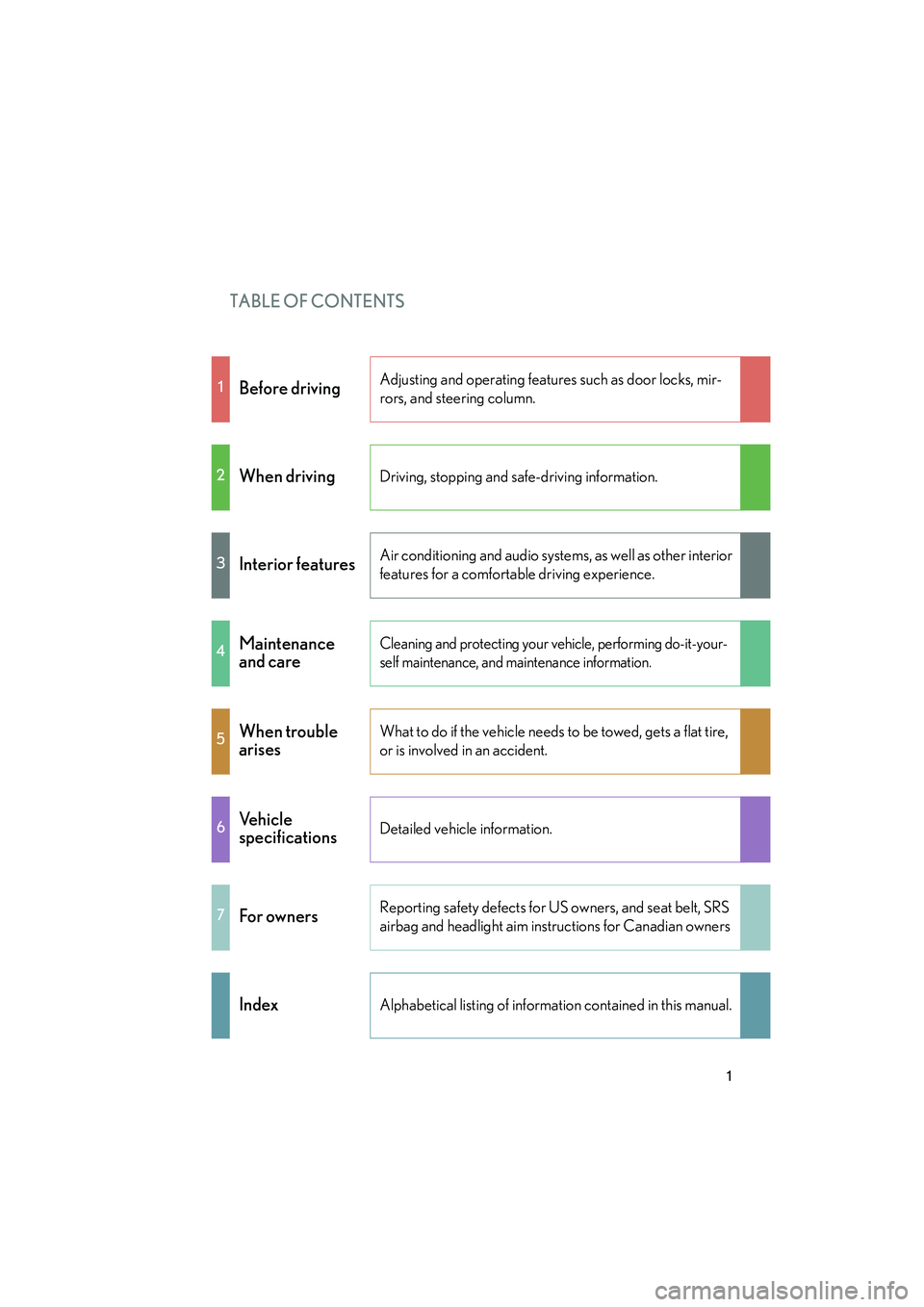
TABLE OF CONTENTS
IS F_U
1
1Before drivingAdjusting and operating features such as door locks, mir-
rors, and steering column.
2When drivingDriving, stopping and safe-driving information.
3Interior featuresAir conditioning and audio systems, as well as other interior
features for a comfortable driving experience.
4Maintenance
and careCleaning and protecting your vehicle, performing do-it-your-
self maintenance, and maintenance information.
5When trouble
arisesWhat to do if the vehicle needs to be towed, gets a flat tire,
or is involved in an accident.
6Ve h i c l e
specificationsDetailed vehicle information.
7For ownersReporting safety defects for US owners, and seat belt, SRS
airbag and headlight aim instructions for Canadian owners
IndexAlphabetical listing of information contained in this manual.
Page 3 of 586
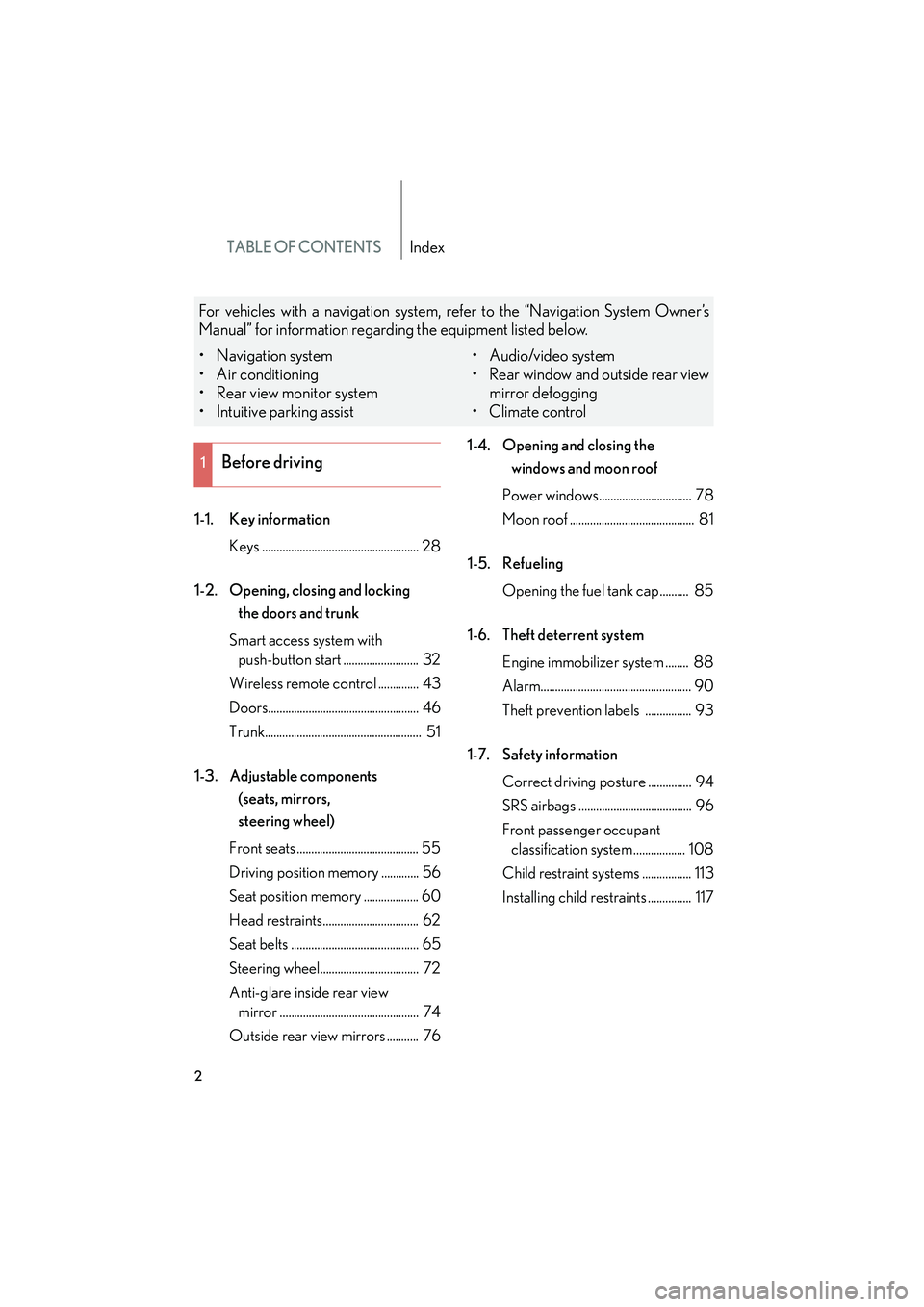
TABLE OF CONTENTSIndex
2
IS F_U
1-1. Key informationKeys ...................................................... 28
1-2. Opening, closing and locking the doors and trunk
Smart access system with push-button start .......................... 32
Wireless remote control .............. 43
Doors.................................................... 46
Trunk...................................................... 51
1-3. Adjustable components (seats, mirrors,
steering wheel)
Front seats .......................................... 55
Driving position memory ............. 56
Seat position memory ................... 60
Head restraints................................. 62
Seat belts ............................................ 65
Steering wheel.................................. 72
Anti-glare inside rear view mirror ................................................ 74
Outside rear view mirrors ........... 76 1-4. Opening and closing the
windows and moon roof
Power windows................................ 78
Moon roof ........................................... 81
1-5. Refueling Opening the fuel tank cap.......... 85
1-6. Theft deterrent system Engine immobilizer system ........ 88
Alarm.................................................... 90
Theft prevention labels ................ 93
1-7. Safety information Correct driving posture ............... 94
SRS airbags ....................................... 96
Front passenger occupant classification system .................. 108
Child restraint systems ................. 113
Installing child restraints ............... 117
1Before driving
For vehicles with a navigation system, refer to the “Navigation System Owner’s
Manual” for information regarding the equipment listed below.
• Navigation system
• Air conditioning
• Rear view monitor system
• Intuitive parking assist • Audio/video system
• Rear window and outside rear view
mirror defogging
• Climate control
Page 4 of 586
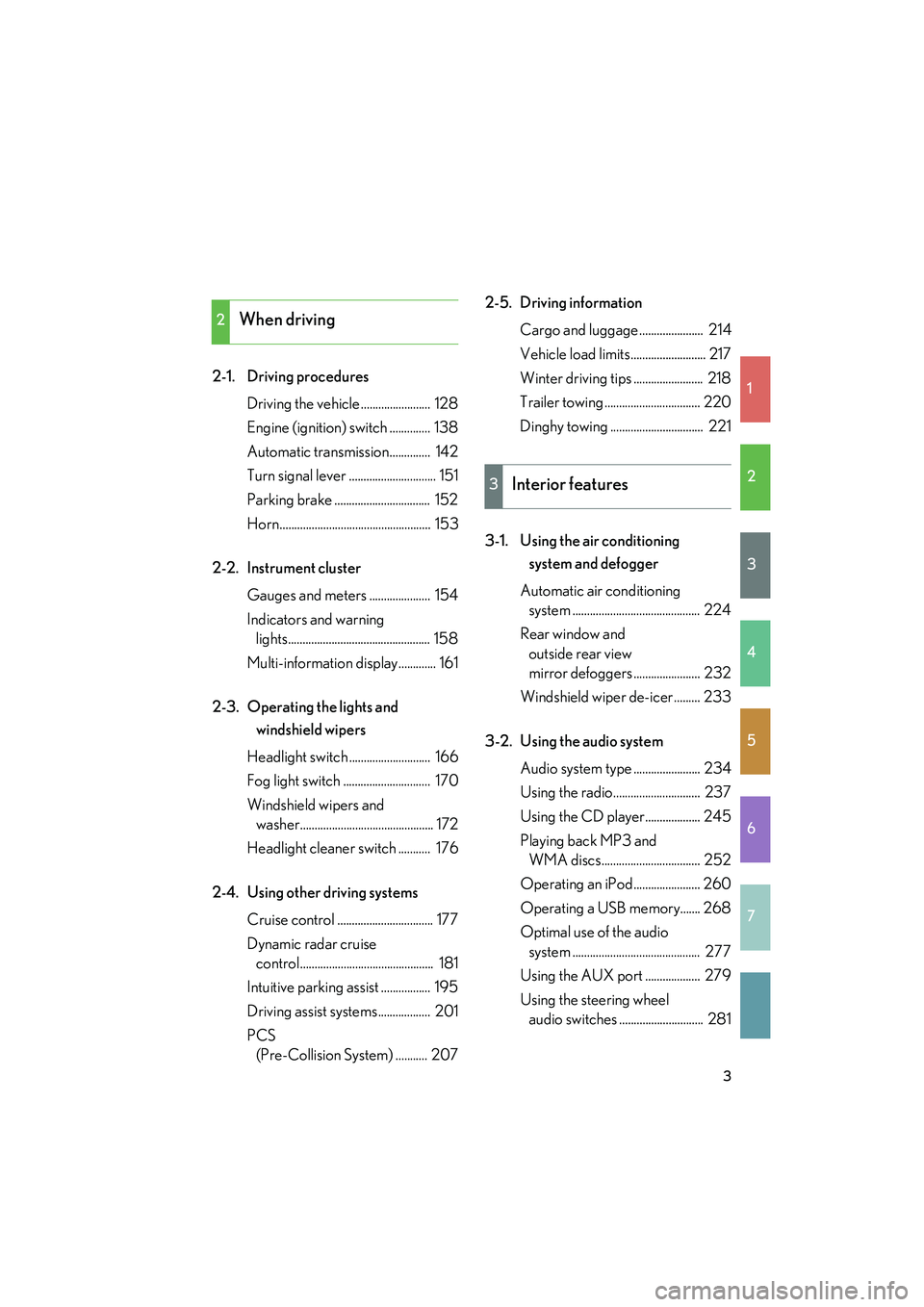
1
2
3
4
5
6
7
3
IS F_U
2-1. Driving proceduresDriving the vehicle ........................ 128
Engine (ignition) switch .............. 138
Automatic transmission.............. 142
Turn signal lever .............................. 151
Parking brake ................................. 152
Horn.................................................... 153
2-2. Instrument cluster Gauges and meters ..................... 154
Indicators and warning lights................................................. 158
Multi-information display............. 161
2-3. Operating the lights and windshield wipers
Headlight switch ............................ 166
Fog light switch .............................. 170
Windshield wipers and washer.............................................. 172
Headlight cleaner switch ........... 176
2-4. Using other driving systems Cruise control ................................. 177
Dynamic radar cruise control.............................................. 181
Intuitive parking assist ................. 195
Driving assist systems.................. 201
PCS (Pre-Collision System) ........... 207 2-5. Driving information
Cargo and luggage ...................... 214
Vehicle load limits.......................... 217
Winter driving tips ........................ 218
Trailer towing ................................. 220
Dinghy towing ................................ 221
3-1. Using the air conditioning system and defogger
Automatic air conditioning system ............................................ 224
Rear window and outside rear view
mirror defoggers ....................... 232
Windshield wiper de-icer ......... 233
3-2. Using the audio system Audio system type ....................... 234
Using the radio.............................. 237
Using the CD player................... 245
Playing back MP3 and WMA discs.................................. 252
Operating an iPod....................... 260
Operating a USB memory....... 268
Optimal use of the audio system ............................................ 277
Using the AUX port ................... 279
Using the steering wheel audio switches ............................. 281
2When driving
3Interior features
Page 6 of 586
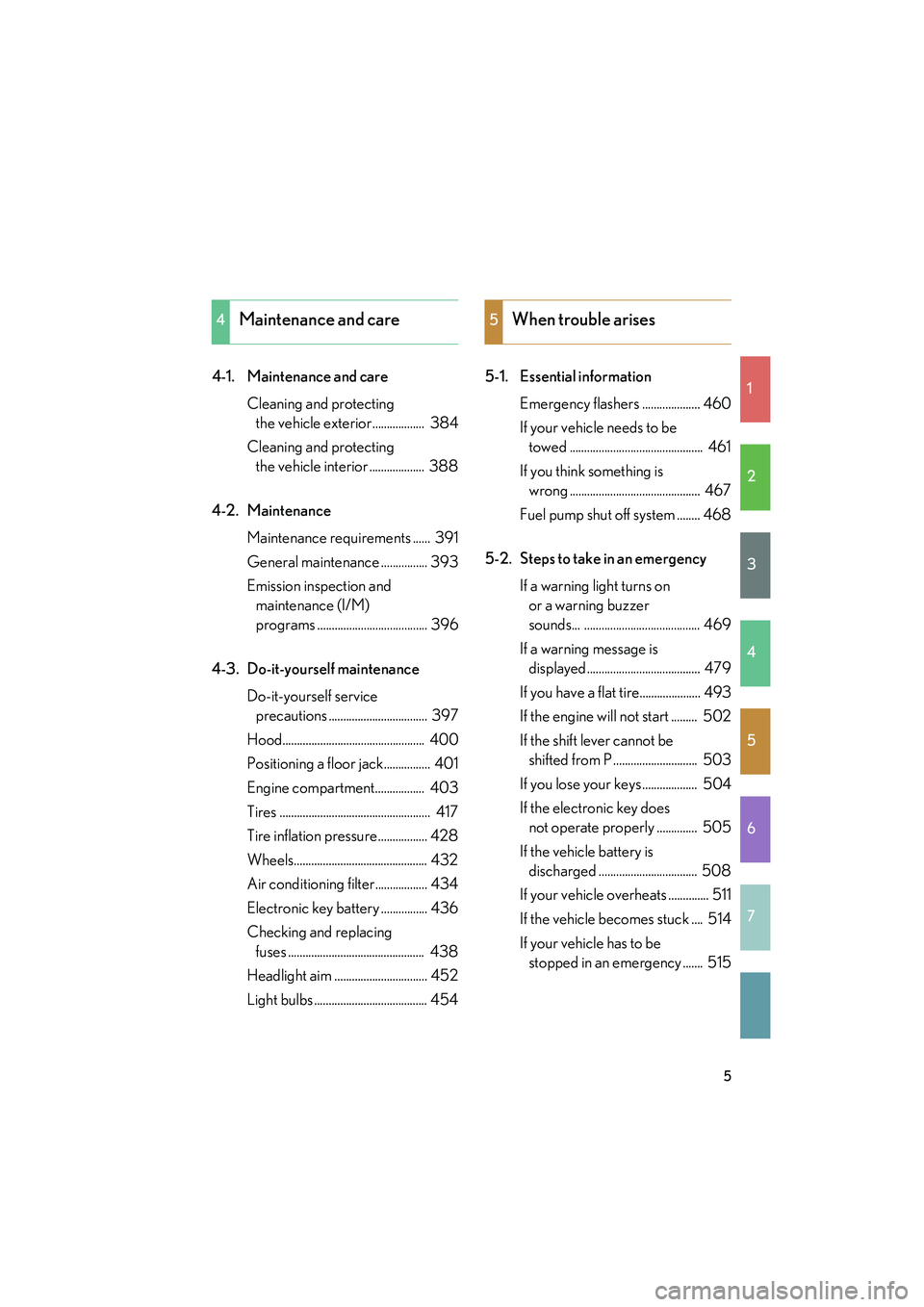
1
2
3
4
5
6
7
5
IS F_U
4-1. Maintenance and careCleaning and protecting the vehicle exterior.................. 384
Cleaning and protecting the vehicle interior ................... 388
4-2. Maintenance Maintenance requirements ...... 391
General maintenance ................ 393
Emission inspection and maintenance (I/M)
programs ...................................... 396
4-3. Do-it-yourself maintenance Do-it-yourself service precautions .................................. 397
Hood................................................. 400
Positioning a floor jack................ 401
Engine compartment................. 403
Tires .................................................... 417
Tire inflation pressure................. 428
Wheels.............................................. 432
Air conditioning filter.................. 434
Electronic key battery ................ 436
Checking and replacing fuses ............................................... 438
Headlight aim ................................ 452
Light bulbs ....................................... 454 5-1. Essential information
Emergency flashers .................... 460
If your vehicle needs to be towed .............................................. 461
If you think something is wrong ............................................. 467
Fuel pump shut off system ........ 468
5-2. Steps to take in an emergency If a warning light turns on or a warning buzzer
sounds... ........................................ 469
If a warning message is displayed....................................... 479
If you have a flat tire..................... 493
If the engine will not start ......... 502
If the shift lever cannot be shifted from P ............................. 503
If you lose your keys ................... 504
If the electronic key does not operate properly .............. 505
If the vehicle battery is discharged .................................. 508
If your vehicle overheats .............. 511
If the vehicle becomes stuck .... 514
If your vehicle has to be stopped in an emergency ....... 515
4Maintenance and care5When trouble arises
Page 16 of 586

IS F_U
15
Without navigation system
Clock
P. 347
Audio
system
P. 234
Air conditioning
system
P. 224Rear window and out-
side rear view mirror
defoggers
P. 232
Security indicator
P. 88, 90
Emergency flasher
switch
P. 460
A
Page 17 of 586

IS F_U
16
Pictorial indexInstrument panel
A
Navigation
system
*2
Clock P. 347
Security indicator
P. 88, 90
Emergency flasher
switch
P. 460
Air conditioning
system
*2
With navigation system
Rear window and
outside rear view
mirror defoggers
*2
Audio system*2
Page 23 of 586
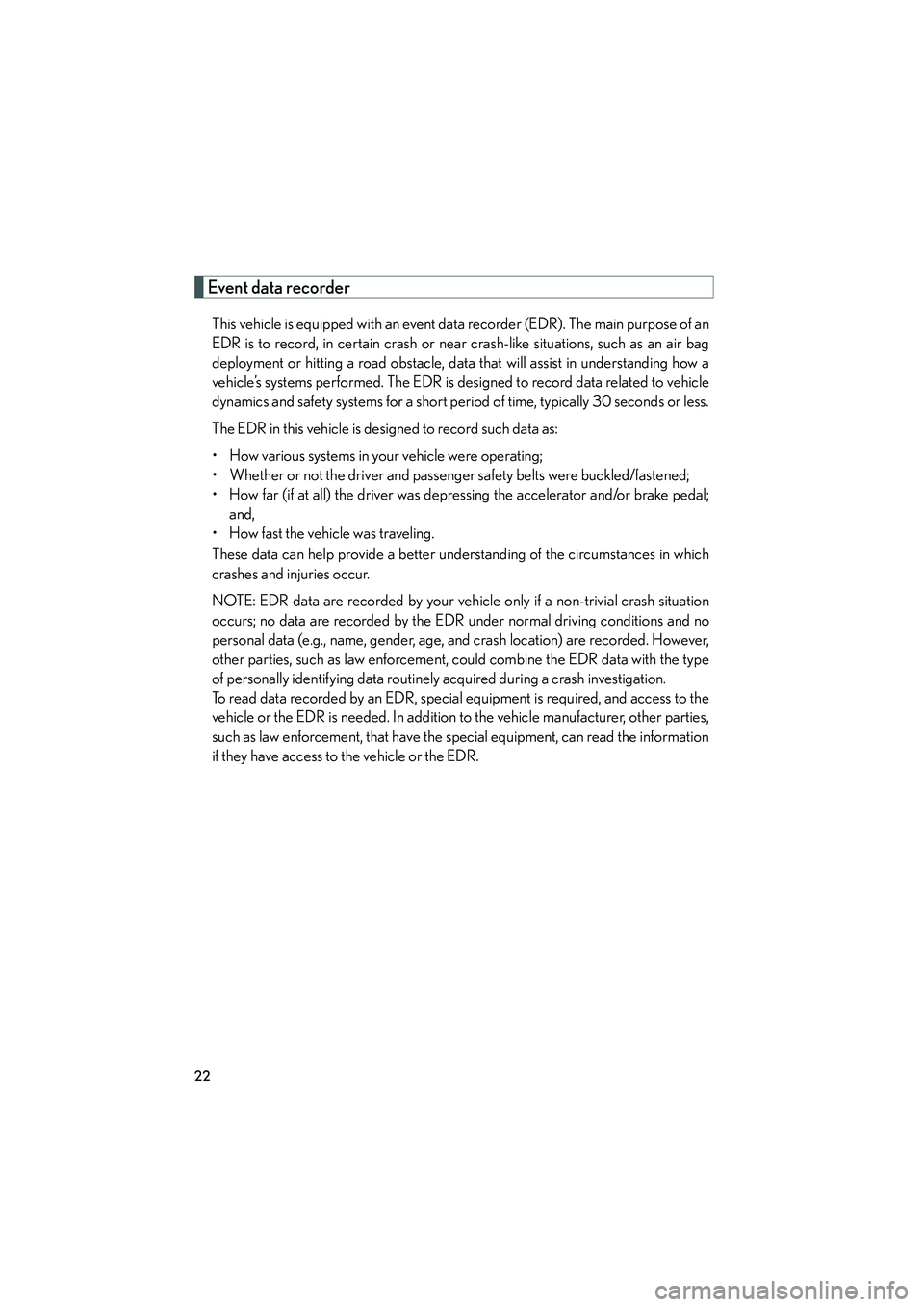
IS F_U
22
Event data recorder
This vehicle is equipped with an event data recorder (EDR). The main purpose of an
EDR is to record, in certain crash or near crash-like situations, such as an air bag
deployment or hitting a road obstacle, data that will assist in understanding how a
vehicle’s systems performed. The EDR is designed to record data related to vehicle
dynamics and safety systems for a short period of time, typically 30 seconds or less.
The EDR in this vehicle is designed to record such data as:
• How various systems in your vehicle were operating;
• Whether or not the driver and passenger safety belts were buckled/fastened;
• How far (if at all) the driver was depressing the accelerator and/or brake pedal;and,
• How fast the vehicle was traveling.
These data can help provide a better understanding of the circumstances in which
crashes and injuries occur.
NOTE: EDR data are recorded by your vehicle only if a non-trivial crash situation
occurs; no data are recorded by the EDR under normal driving conditions and no
personal data (e.g., name, gender, age, and crash location) are recorded. However,
other parties, such as law enforcement, could combine the EDR data with the type
of personally identifying data routinely acquired during a crash investigation.
To read data recorded by an EDR, special equipment is required, and access to the
vehicle or the EDR is needed. In addition to the vehicle manufacturer, other parties,
such as law enforcement, that have the special equipment, can read the information
if they have access to the vehicle or the EDR.
Page 37 of 586

36
1-2. Opening, closing and locking the doors and trunk
IS F_U
■Operation signals
A buzzer sounds and the emergency flashers flash to indicate that the doors have
been locked/unlocked. (Locked: Once; Unlocked: Twice)
■Conditions affecting operation
The smart access system with push-button start uses weak radio waves. In the fol-
lowing situations, the communication between the electronic key and the vehicle
may be affected, preventing the smart access system with push-button start from
operating properly:
(Ways of coping: →P. 505)
●When the electronic key battery is depleted
●Near a TV tower, electric power plant, gas station, radio station, large display,
airport or other facility that generates strong radio waves or electrical noise
●When carrying a portable radio, cellular phone, cordless phone or other wire-
less communication devices
●When the electronic key is in contact with, or is covered by the following metal-
lic objects
• Cards to which aluminum foil is attached
• Cigarette boxes that have aluminum foil inside
• Metallic wallets or bags
•Coins
• Hand warmers made of metal
• Media such as CDs and DVDs
●When multiple electronic keys are in the vicinity
●When another wireless key (that emits radio waves) is being used nearby
●When carrying or using the electronic key together with the following devices
that emit radio waves
• Another vehicle's electronic key or a wireless key that emits radio waves
• Personal computer or personal digital assistant (PDA)
• Digital audio player
• Portable game system
●If window tint with a metallic content or metallic objects are attached to the rear
window
Page 100 of 586

99
1-7. Safety information
1
Before driving
IS F_U
■SRS airbag deployment conditions (front airbags)
●The SRS front airbags will deploy in the event of an impact that exceeds the
set threshold level (the level of force corresponding to an approximately 12 -
18 mph [20 - 30 km/h] frontal collision with a fixed wall that does not move or
deform).
However, this threshold velocity will be considerably higher if the vehicle strikes
an object, such as a parked vehicle or sign pole, which can move or deform on
impact, or if the vehicle is involved in an underride collision (e.g. a collision in
which the front of the vehicle “underrides”, or goes under, the bed of a truck, etc.).
●Depending on the type of collision, it is possible that only the seat belt
pretensioners will activate.
●The SRS front airbags for the front passenger will not activate if there is no pas-
senger sitting in the front passenger seat. However, the SRS front airbags for the
front passenger may deploy if luggage is put in the seat, even if the seat is unoc-
cupied. (→P. 1 0 8 )
■SRS airbag deployment conditions (side and curtain shield airbags)
●The SRS side airbags and SRS curtain shield airbags will deploy in the event of
an impact that exceeds the set threshold level (the level of force corresponding
to the impact force produced by an approximately 3300 lb. [1500 kg] vehicle
colliding with the vehicle cabin from a direction perpendicular to the vehicle
orientation at an approximate speed of 12 - 18 mph [20 - 30 km/h]).
●The SRS side airbag on the passenger seat will not activate if there is no passen-
ger sitting in the front passenger seat. However, the side airbag on the passen-
ger seat may deploy if luggage is put in the seat, even if the seat is unoccupied.
( → P. 1 0 8 )
Page 101 of 586
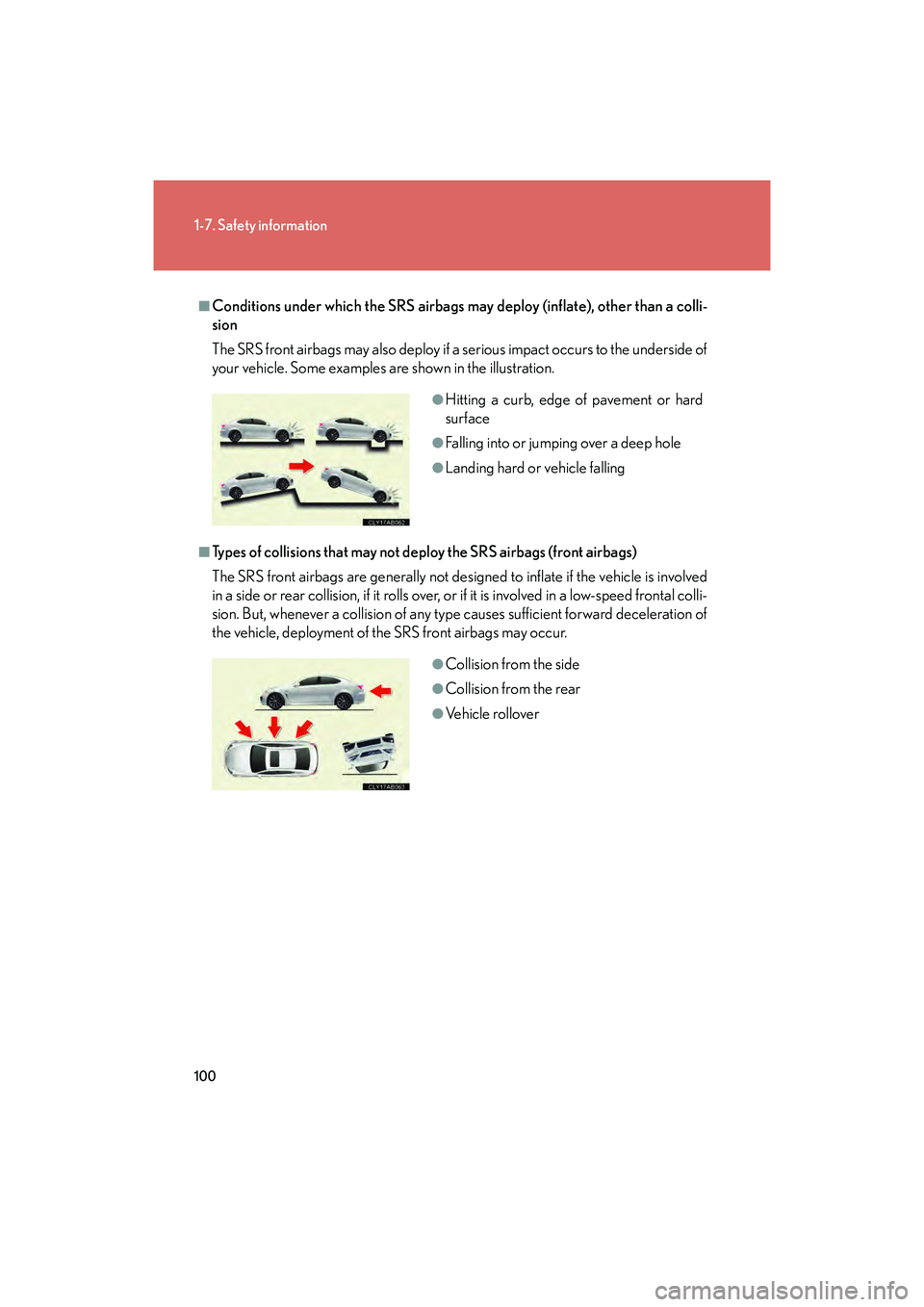
100
1-7. Safety information
IS F_U
■Conditions under which the SRS airbags may deploy (inflate), other than a colli-
sion
The SRS front airbags may also deploy if a serious impact occurs to the underside of
your vehicle. Some examples are shown in the illustration.
■Types of collisions that may not de ploy the SRS airbags (front airbags)
The SRS front airbags are generally not designed to inflate if the vehicle is involved
in a side or rear collision, if it rolls over, or if it is involved in a low-speed frontal colli-
sion. But, whenever a collision of any type causes sufficient forward deceleration of
the vehicle, deployment of the SRS front airbags may occur.
●Hitting a curb, edge of pavement or hard
surface
●Falling into or jumping over a deep hole
●Landing hard or vehicle falling
●Collision from the side
●Collision from the rear
●Vehicle rollover